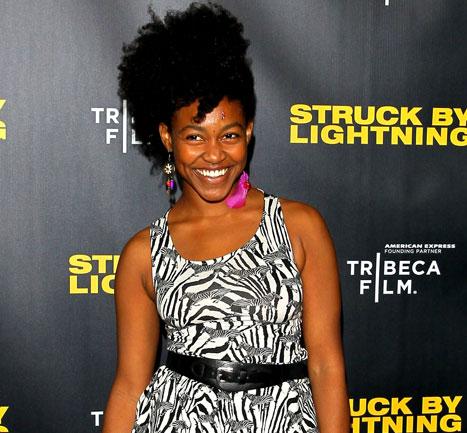Daniele Watts Controversy Brings Up Issues Of Race, Gender And Sexuality

Daniele Watts will never forget one piece of advice her mother gave her as a child.
“You have to work twice as hard to not get in trouble. You have to work twice as hard to get what the white girls in your class get handed to them because people are threatened by your blackness,” said Watts to a packed auditorium during a conversation hosted by the USC Gould School of Law on race, sexual expression and civil rights law Monday afternoon.
Watts, an actress whose first major movie role was in Quentin Tarantino's “Django Unchained,” made headlines on Sept. 11 when an LAPD officer handcuffed her after receiving a call that a couple was having sex in a car. Although Watts and her boyfriend Brian Lucas, who is white, were later charged with lewd conduct, Watts maintains the pair’s innocence.
A goal of the law school’s discussion of the Daniele Watts case was to raise consciousness about the intersections of race, gender and sexuality in relation to the law. The main area of focus was on the position of black women in American society.
The Perceptions of Black Women
Lisa Wade is an Associate Professor of Sociology at Occidental College who specializes in culture and sexuality. She says stereotypes of black women today revolve around the notion of the group being “somehow irresponsible with their sexuality.”
“[These stories] come about from slavery when we needed to justify how we had this gender ideology for white people, that portrays women as more fragile and as more sexually reserved,” said Wade.
She continued, “In order to make sense of that disconnect of what we believed about white women versus black women, we invented this idea that black women were generally more masculine than white women. Therefore, they could do hard labor and part of being more masculine was being more sexually irresponsible.”
African-American media and social commentator Jasmyne Cannick listed other modern day tropes of black women including the prostitute and the mammy that serve to depict those women in a negative light.
From this perspective of viewing black women, Wade surmises if someone saw Watts and Lucas being amorous and called the police, it was because of an application of his cultural lens to the situation.
“Specifically the idea of a black woman with a white man that that would be by choice and not some sort of fetish on his part or job on her part is [something] that culturally doesn’t make such sense for us,” said Wade.
SEE ALSO: It Will Always Be About "Big Booty"
Panelist Shana L. Redmond, Ph.D., Associate Professor in American Studies and Ethnicity, vocalized a fascination with black women’s sexuality as something that “has been criminalized and made spectacle for other people’s enjoyment and disgust.”
In the case of Watts, an audiotape of the incident sent to TMZ by the officer who arrested her, Jim Parker, added to the frenzy by pitting the two individuals against one another and bringing up issues with “playing the race card.”
What Professor of Law and Sociology Camille Gear Rich found troubling about how this discourse was told and which questions were being asked was the greater question of, “Is that what we want to rely on to frame public debate on this issue?”
The Civil Rights Defense
Cannick, however, disagrees and does not take claims of racial profiling lightheartedly and says “for those of us who have seen or witnessed or have been the victims of racial profiling, it was a slap in the face.”
“We’re talking about situations where people did not walk away from it to get on Twitter or Facebook, where people died and were killed by law enforcement,” said Cannick.
She continued, “That’s probably one of the most irritating things about this whole situation is that in the midst of Ferguson and Ezell Ford here in Los Angeles, you have someone who’s spewing ‘racial profiling’ in a bill that did not fit. That’s not what it was.”
SEE ALSO: Ferguson, Mo. Is Making Us Confront Racism In The Media
Redmond, however, disagrees and sees this as one of the ways civil rights is gendered towards the experiences of men.
“If you’re not threatened with death, does that mean you’re not presenting a valid civil rights issue?”
A Drop In The Bucket
“If this had happened 50 years ago, she would have just had to put her head down and say ‘yes, sir;’ there’s no room for her there at all to even make a claim of injustice,” said Wade.
Wade acknowledges Watts’ status and celebrity are not to be ignored in the midst of this controversy. Having the ability to pen a piece in the L.A. Times and write a Facebook post that got over 8,000 likes is powerful.
Although things are hard to change, she believes things can.
"This incident is one, hopefully, that will be a drop in the bucket. Where the next time it happens and the next time something like this gets some publicity, we’ll remember," said Wade.
“But the fact she was able to do so is a pretty good sign that there’s faith for resistance.”
Reach Staff Reporter Jessica Moulite here. Follow her on Twitter.



